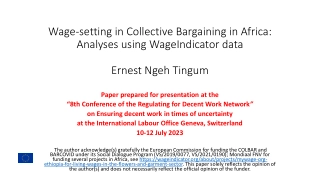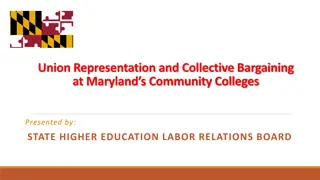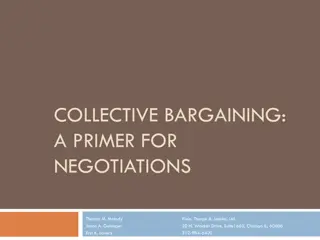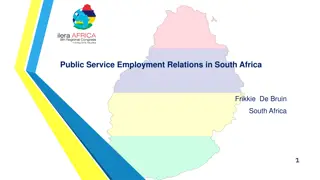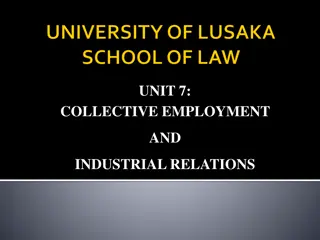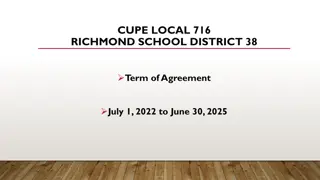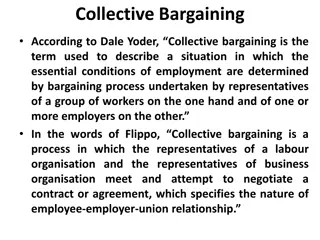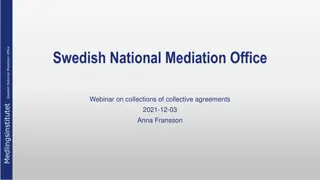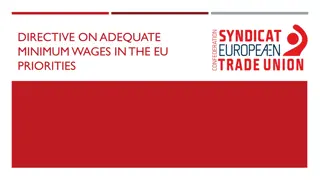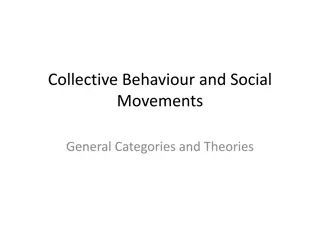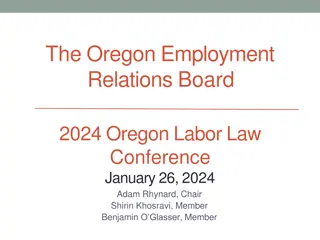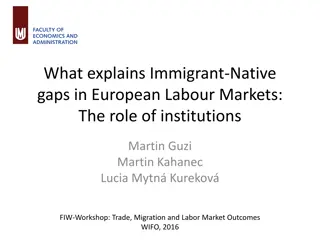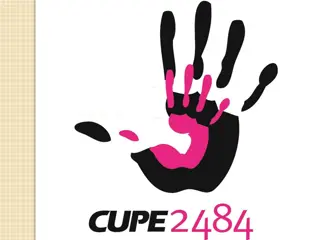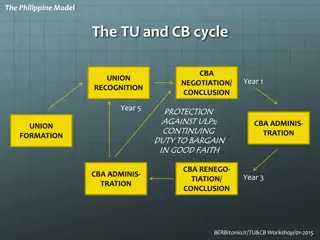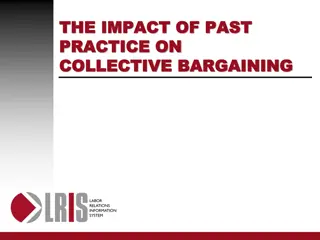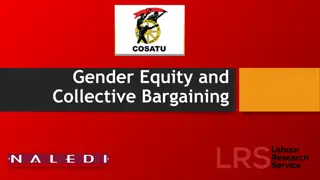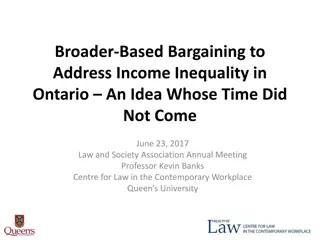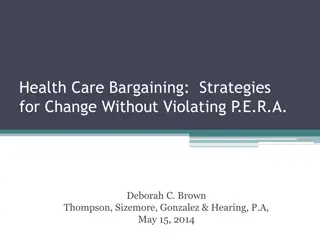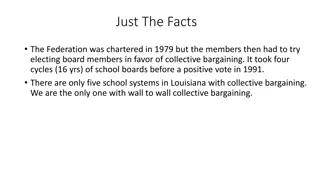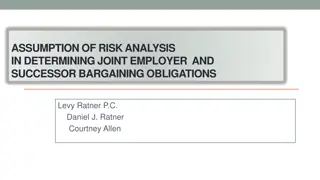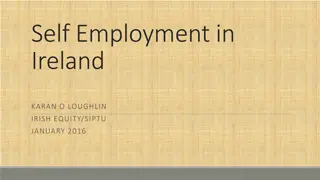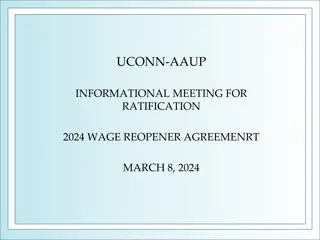Understanding Collective Bargaining: Insights on Wage Setting in Africa
Explore wage-setting systems in Africa through collective bargaining negotiations to address inequality and social justice. This paper analyzes the content of agreements using the WageIndicator database, shedding light on pay-settings and related clauses. Specific issues addressed include additional
0 views • 10 slides
Maryland Community College Collective Bargaining: Overview & Implementation
Maryland's Community College Collective Bargaining Law, enacted in 2021, grants employees bargaining rights. The law covers union representation selection, bargaining obligations, unfair labor practice protection, and enforcement by the State Higher Education Labor Relations Board (SHELRB). SHELRB o
1 views • 33 slides
Overview of Collective Bargaining in the Department of Employment and Labour
The Department of Employment and Labour Portfolio Committee Workshop in February 2021 discussed collective bargaining, emphasizing the protection of trade unions and employers' organizations in engaging in negotiations. Levels of bargaining include centralized, company level, and plant level negotia
0 views • 17 slides
A Guide to Collective Bargaining in Illinois: Understanding the Public Labor Relations Act
Dive into the essential aspects of collective bargaining within the framework of the Illinois Public Labor Relations Act. Learn about laws, coverage, and exclusions, including key provisions for public employers, employees, and labor organizations involved in negotiations.
0 views • 74 slides
Overview of Cooperative Game Theory and Bargaining Solutions
Cooperative game theory explores situations where players have mutual benefits in cooperating. The focus is on bargaining solutions to reach agreements despite conflicting interests. Key concepts include Nash Bargaining Solution, Kalai-Smorodinsky Bargaining Solution, and Rubinstein Bargaining Proce
1 views • 24 slides
Public Service Employment Relations in South Africa: Overview
The South African public service employment relations are governed by various acts including the Labour Relations Act, Basic Conditions of Employment Act, and others. The legal framework emphasizes collective bargaining, with the Public Service Coordinating Bargaining Council playing a key role. The
0 views • 17 slides
Understanding Labour Relations in Entrepreneurship
This module delves into the intricacies of labour relations within entrepreneurship. Topics covered include collective bargaining, mediation, arbitration, and applicable labour legislation for small businesses. The importance of good labour relations and disciplinary actions for code violations are
0 views • 18 slides
Understanding Collective Employment and Industrial Relations
Collective employment involves negotiations between employers and employee representatives to establish working conditions, wages, and more. These agreements, known as collective bargaining agreements, are crucial in defining the terms of employment. International conventions recognize the right to
0 views • 44 slides
Collective Agreement Highlights for CUPE Local 716 Richmond School District 38 (2022-2025)
The collective agreement outlines wage increases based on the Provincial Framework Agreement for the years 2022-2025, includes updates on equity and inclusion with a focus on no discrimination, addresses para-educators' hours of work and overtime, revises standby allowances, and introduces a new pro
0 views • 34 slides
Understanding Plea Bargaining in Criminal Cases
Plea bargaining is a negotiation process where the accused admits guilt in exchange for a reduced punishment. It helps in resolving cases faster and reducing court congestion. The concept is applicable to cases with a maximum sentence of 7 years, not involving women or children under 14, and not imp
2 views • 14 slides
State Pension Plan Provisions Changes Effective July 1, 2022
The 2017 collective bargaining agreement between the State and the State Employees Bargaining Coalition introduced changes to retirement terms for state employees, affecting members of the State Employees Retirement System (SERS) and the Alternate Retirement Plan (ARP). Changes include adjustments t
5 views • 15 slides
Understanding the Significance of Collective Bargaining in the Workplace
Collective bargaining is a crucial process where representatives of employees and employers negotiate employment conditions, fostering mutual respect and responsibility. It benefits employees by increasing morale, productivity, and ensuring fair treatment. For employers, it aids in issue resolution,
0 views • 11 slides
StreetNet International: Empowering Street Vendors Worldwide
StreetNet International is a global alliance uniting street vendors, market hawkers, and organizations worldwide. With over 52 affiliated organizations and more than 600,000 members, StreetNet focuses on collective bargaining, negotiation skills development, and representation for street vendors. Th
1 views • 8 slides
Swedish National Mediation Office Webinar on Collections of Collective Agreements
The National Mediation Office in Sweden, established in 2000, plays a crucial role in mediating labor disputes and promoting efficient wage formation processes. They appoint mediators when necessary and analyze collective agreements to facilitate mediation efforts. This includes maintaining a regist
0 views • 5 slides
Understanding Collective Bargaining in the Department of Employment and Labour Portfolio Committee Workshop
The Department of Employment and Labour Portfolio Committee Workshop in February 2021 focused on the importance of collective bargaining in South Africa. The workshop highlighted the protection of the right to engage in collective bargaining as outlined in the country's Constitution and the signific
0 views • 17 slides
Private Social Services Sector Collective Agreement Summary 2023-2025
The Private Social Services Sector Collective Agreement effective from 1 May 2023 to 31 December 2025 includes a 3.6% general raise in 2023, varied minimum salary scale increases across competence groups and service steps, and one-time instatement payments for different employee categories in 2024.
0 views • 19 slides
Directive on Adequate Minimum Wages in the EU Priorities
Priority 1 emphasizes protecting against unintended consequences and detrimental impact by amending definitions of collective bargaining, monitoring mechanisms, and promoting real improvements in national action plans. Priority 2 focuses on ensuring the Directive lives up to its aims by introducing
0 views • 4 slides
Understanding Collective Behaviour and Social Movements: Theories and Examples
Collective behaviour involves voluntary and often spontaneous actions by a large group of people that defy societal norms, with examples ranging from panics and mobs to celebrations and riots. Conditions such as timing, social control breakdown, and structural strains can trigger collective behaviou
0 views • 26 slides
Overview of Oregon Employment Relations Board (ERB) and Its Jurisdiction
The Oregon Employment Relations Board (ERB) plays a crucial role in regulating labor relations in Oregon, overseeing collective bargaining and resolving disputes in both the public and private sectors. Composed of three board members representing labor, management, and the public, the ERB handles is
0 views • 20 slides
Challenges in Promoting Collective Bargaining and Fighting Anti-Union Busting
The European Trade Union Confederation (ETUC) highlights the importance of the Directive on adequate minimum wages in the EU to combat union busting practices. While the Directive addresses some demands related to promoting collective bargaining, there is a need for further strengthening to effectiv
0 views • 13 slides
Understanding Immigrant-Native Gaps in European Labor Markets
The paper explores the role of institutions in explaining immigrant-native gaps in European labor markets, focusing on aspects like labor market regulation, skill regime, welfare state regime, and production regime. It discusses how factors such as job prospects for immigrants, centralized wage barg
0 views • 23 slides
Understanding Labor Unions and Collective Agreements in the Workplace
A labor union, also known as a trade union in British English or a labor union in Canadian English, is formed by workers to achieve common goals such as better pay, improved working conditions, and job security. Through collective bargaining, unions negotiate with employers to improve wages, benefit
0 views • 29 slides
Understanding Collective Bargaining in School Districts
Collective bargaining in school districts involves negotiating over mandatory and permissive subjects such as wages, hours, and conditions of employment. School districts must differentiate between mandatory and permissive subjects, and disputes over mandatory subjects must be resolved through impas
0 views • 29 slides
Labor Market Trends and Union Growth in the Philippines
The Philippine model of trade unionism involves a cycle of union recognition, negotiation, and conclusion, with a continuing duty to bargain in good faith. The trade union structure consists of three levels with one level of collective bargaining. The context of trade unions and collective bargainin
0 views • 43 slides
Understanding the Impact of Past Practices on Collective Bargaining
Exploring the significance of past practices in interpreting, supplementing, and potentially contradicting contract language within the context of collective bargaining. Covering topics such as the definition of past practices, the duty to bargain, waivers of protest rights, and remedies for unlawfu
0 views • 35 slides
Comparison of APSCUF CBA with Other Contracts in Higher Education
Explore the key provisions of the APSCUF Collective Bargaining Agreement (CBA) that aims to protect and defend faculty members in higher education. Compare how the APSCUF CBA differs from other contracts in areas such as coverage of adjuncts, conversion language, pay scales, and more. Delve into art
0 views • 44 slides
Comparative Analysis of Plea Bargaining in Criminal Justice Systems
Research by Dr. Dorota Czerwinska delves into the practice of plea bargaining, examining its roots, benefits, and ethical considerations in various countries such as the USA, England, France, Germany, Italy, and Poland. The study explores the reasons behind the development of plea bargaining and que
0 views • 27 slides
Gender Equity and Collective Bargaining for Women Workers
Gender equity and collective bargaining play crucial roles in addressing gender inequality in the workplace. By advocating for fair treatment and opportunities for women, addressing discrimination, and organizing around women workers' rights, these efforts can combat the systemic issues that contrib
0 views • 17 slides
Addressing Income Inequality Through Broader-Based Bargaining
A discussion on broader-based bargaining as a solution to income inequality in Ontario, despite the challenges faced in implementing it. The review highlights the importance of addressing inequality in the workforce and explores the impact of broader-based bargaining on wages, union coverage, and ov
0 views • 20 slides
Health Care Bargaining Strategies Without Violating P.E.R.A.
Strategies for addressing health care in collective bargaining without violating P.E.R.A., including insights on mandatory bargaining subjects, likely litigation issues, and challenges faced. Exploring general rules, problematic aspects, potential ULPs, and premature impasse declarations in health c
0 views • 29 slides
Evolution of Collective Bargaining in Louisiana's School Systems
The Federation in Louisiana was chartered in 1979, eventually securing collective bargaining rights in 1991 after multiple cycles of school board elections. Currently, it is the only school system in the state with wall-to-wall collective bargaining. The Federation has established specific provision
0 views • 26 slides
Collective Agreements and Union Settlements Process
Collective agreements play a significant role in determining pay and working conditions in workplaces. Trade unions negotiate national collective agreements with employers to secure better terms for employees. The process involves bargaining, principal settlements, and organized democracy within the
0 views • 10 slides
The German Experience with Social Dialogue and Collective Bargaining in Journalism
Germany has a unique history with social dialogue and collective bargaining in journalism, with differing opinions on its applicability in the industry. Collective bargaining for journalists began in the 1950s, but the implementation has varied across different media sectors. While public broadcasti
0 views • 9 slides
Evolution and Significance of Collective Bargaining in Industrial Relations
The term "collective bargaining" was coined in 1891 by Mrs. Beatrice Webb to represent workers' efforts to secure better wages and benefits collectively. The concept gained legal recognition in 1956 to formalize agreements between employers and workers. Collective bargaining resolves disputes and ev
0 views • 6 slides
Analysis of Joint Employer and Successor Bargaining Obligations
Delve into the complexities of joint employer relationships and successor bargaining obligations through the lens of assumption of risk analysis. Explore key cases, such as Browning Ferris Industries and Nexeo Solutions, to understand the evolving legal landscape surrounding collective bargaining ri
0 views • 21 slides
Understanding Intergroup Agreement and Disagreement Measures in Biostatistics
This presentation by Madhusmita Panda, an Associate Biostatistician at Cytel, discusses the importance of measuring intergroup agreement and disagreement in statistical analysis. The content covers various measures available in literature, intuitive approaches for measurement, and includes a hypothe
0 views • 19 slides
Collective Bargaining Impasse at UFF-UF: Salary Disputes and Promotion Issues
A detailed description of an impasse presentation involving key stakeholders at UFF-UF, highlighting unresolved issues such as effective dates for salary increases, low promotion raises, and other salary-related concerns. The negotiation challenges and proposed solutions are discussed, shedding ligh
0 views • 39 slides
Industrial Relations System in Ireland for Self-Employed Cultural Workers
Irish industrial relations system caters to self-employed cultural workers with a voluntarist style of collective bargaining. Despite limitations in bargaining rights, dialogue with the government has led to exemptions and legal precedents for worker definitions and compensation. The system faces im
0 views • 10 slides
Decentring Collective Action in Internet Activism: A Study on Collective Agency in China
This study explores the concept of collective agency in internet activism within the context of social movements in China. It discusses the role of ICT in virtual collective action, the structural preconditions for collective action, and the shift towards a more decentralized approach to collective
1 views • 16 slides
UCONN-AAUP Informational Meeting for Ratification 2024 Wage Reopener Agreement
The UConn-AAUP Executive Committee has accepted the 4th Year Wage Reopener from the Negotiating Team and is recommending approval of the Temporary Agreement to its membership. A 2021-2025 CBA was ratified in March 2022 with contract language improvements and wage increases. The 4th Year Reopener sta
1 views • 9 slides
